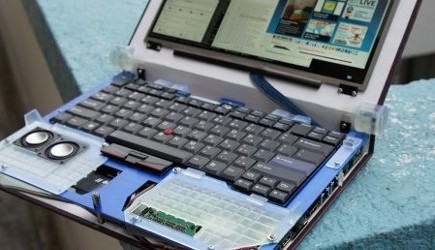Taking Control With An Open Source Hardware Laptop
January 23, 2014
on
on

After 1.5 years of work hackers Bunnie Huang and Sean 'xobs' Cross have working prototypes of an open source laptop. Specs and source files are available for those who'd like to follow in their footsteps.
The power of open source has long been established in the field of software. Coders can assess, fork and improve each others work. What is more, to know the code that runs your device increases your level of control over it. That's especially important with regards to security since closed source or black box programs force you to blindly trust a third party. Open software, on the contrary, can be publicly audited by as many eyes as care to look over the course of years.
But software solutions are of little use when it runs on compromised hardware. After many years of speculation about the existence of hardware backdoors in the wild, late 2013Snowden documents revealed that the NSA has comfortably nestled itself in our machines. Time for open source hardware.
Driven by a wish for full control over their machine paired with an enthusiastic urge to figure out how stuff works, hardware hackers Bunnie Huang and Sean 'xobs' Cross built open source laptops under the name Novena. They've documented the project on the Novena wiki.
Bunnie explains on his blog that one of the aims of building the device is the ability to boot the laptop without having to run any 'binary blobs' or closed source code. There are few components available on the market meeting that requirement. Bunnie specifically mentions Freescale as the only vendor of powerful SoCs which makes its software publicly available in the form of a 6000-page programming manual.
The laptop is neither lightweight nor incredibly fast but those weren't the objectives. It sports a quad-core Cortex A9 1.2 GHz CPU, 4GB DDR3 RAM and boots from a microSD card.
One of the perks of building your own stuff is, of course, customization. Because he's a hardware hacker Bunnie decided to add a FPGA to the mainboard. For the purposes of security research two Ethernet platforms and an USB OTG port were added.
If you want one too, you'll have to build to yourself. For now. Since Novena is receiving a lot of 'I want one too!'s, Bunnie and Xobs are (somewhat reluctantly) planning a crowd funding campaign to produce more units. The campaign is estimated to launch somewhere in February or March, you can stay updated via @novenakosagi.
Hardware backdoors are notoriously difficult to rule out. Bunnie writes: 'Our Novena Project is of course still vulnerable to techniques such as silicon poisoning, but at least it pushes openness and disclosure down a layer, which is tangible progress in the right direction.'
The power of open source has long been established in the field of software. Coders can assess, fork and improve each others work. What is more, to know the code that runs your device increases your level of control over it. That's especially important with regards to security since closed source or black box programs force you to blindly trust a third party. Open software, on the contrary, can be publicly audited by as many eyes as care to look over the course of years.
But software solutions are of little use when it runs on compromised hardware. After many years of speculation about the existence of hardware backdoors in the wild, late 2013
Driven by a wish for full control over their machine paired with an enthusiastic urge to figure out how stuff works, hardware hackers Bunnie Huang and Sean 'xobs' Cross built open source laptops under the name Novena. They've documented the project on the Novena wiki.
Bunnie explains on his blog that one of the aims of building the device is the ability to boot the laptop without having to run any 'binary blobs' or closed source code. There are few components available on the market meeting that requirement. Bunnie specifically mentions Freescale as the only vendor of powerful SoCs which makes its software publicly available in the form of a 6000-page programming manual.
The laptop is neither lightweight nor incredibly fast but those weren't the objectives. It sports a quad-core Cortex A9 1.2 GHz CPU, 4GB DDR3 RAM and boots from a microSD card.
One of the perks of building your own stuff is, of course, customization. Because he's a hardware hacker Bunnie decided to add a FPGA to the mainboard. For the purposes of security research two Ethernet platforms and an USB OTG port were added.
If you want one too, you'll have to build to yourself. For now. Since Novena is receiving a lot of 'I want one too!'s, Bunnie and Xobs are (somewhat reluctantly) planning a crowd funding campaign to produce more units. The campaign is estimated to launch somewhere in February or March, you can stay updated via @novenakosagi.
Hardware backdoors are notoriously difficult to rule out. Bunnie writes: 'Our Novena Project is of course still vulnerable to techniques such as silicon poisoning, but at least it pushes openness and disclosure down a layer, which is tangible progress in the right direction.'
Read full article
Hide full article


Discussion (4 comments)